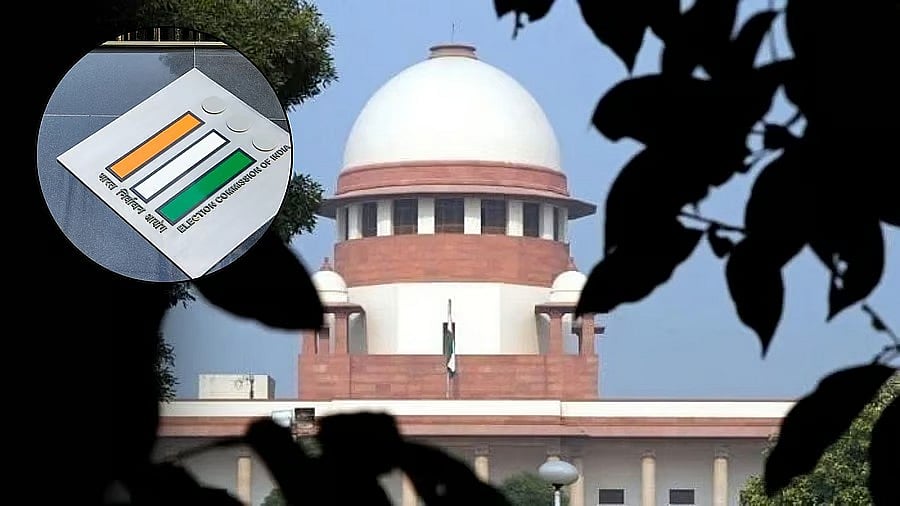
A view of the Supreme Court, EC logo (inset)
Credit: PTI, iStock photo
New Delhi: The Supreme Court on Monday said it can't stop the Election Commission from conducting the special intensive revision of electoral rolls across the country but made it categorical said if any illegality is found in the exercise being conducted in poll-bound Bihar, then the entire process could be set aside.
A bench of Justices Surya Kant and Joymalya Bagchi said the court presumed the Election Commission, being a constitutional authority, was following the law during the SIR in Bihar.
During the hearing on challenge to the SIR in Bihar, senior advocate Rakesh Dwivedi, appearing for the EC asked the court to allow the poll body to complete the entire exercise, and after its completion, the court would be able to assess the exercise better.
Senior advocate Gopal Sankaranarayanan, for one of the petitioners, contended that the EC was moving ahead in connection with the SIR as far as other states are concerned and on September 10, a meeting was conducted for all the states.
He said there is no question of proceeding with other states and establishing fait accompli.
The bench, however, asked, "How the court can stop the Election Commission of India from conducting a similar exercise in other parts of the country".
The court added, "Once this suspense period is over. How many have been issued notice? How many of them have responded? How many of them have come forward for adjudication of their claims can be looked into.”
Advocate Vrinda Grover, also for the petitioners, contended that November 22 is the date on which the Bihar assembly must be in place and if the law says that the last date for nomination is when the electoral roll has to be frozen, and the EC's manual is inconsistent with the statute.
"Why should I, as a citizen residing in Bihar, be denied the opportunity to vote in this election because an illegal methodology has been adopted," she asked.
The bench, however, said if any methodology is illegal, the court will strike it down.
“We will definitely interfere,” the bench assured the petitioners counsel.
Senior advocate A M Singhvi, appearing for one of the petitioners, sought an early date for a detailed hearing on the matter.
“Wherever they are proposing to start the process and meanwhile, whatever judgment we deliver here that will of course apply," the bench said.
The court said it can fix October 7 for hearing final arguments on the validity of Bihar SIR and declined to offer any "piecemeal opinion" on the exercise.
Advocate Prashant Bhushan also for the petitioners contended that there was a gross violation of the rules as well as EC’s own manual, and there was virtually no transparency.
The bench said that the moment it asks EC to respond, it will give a different story, so it will have to hear both stories.
The bench said it was presuming the EC, being a constitutional authority, was following the law during the SIR in Bihar. The bench said that in any case, if they do not follow the rules and regulations, and also their statutory and constitutional obligation, it will list the matter and begin hearing.
During the hearing, the court also refused to modify its September 8 order, where it allowed the inclusion of the Aadhaar card as the 12th document in the revision of the electoral roll in Bihar and that Aadhaar would be used only as a proof of identity.
The bench said the direction is only interim in nature and the issue of the document's validity as proof is still open in the SIR matter.
Advocate Ashwini Kumar Upadhyay asked the court to modify its direction on the ground that Aadhaar cannot be considered as proof of citizenship and cannot be equated with the other documents accepted by the poll body.
"Driving licenses can be forged, ration cards can be forged. Several documents can be forged. Aadhaar is to be utilised to the extent law permits," the bench said, hearing the batch of petitions, challenging the validity of SIR in Bihar.
